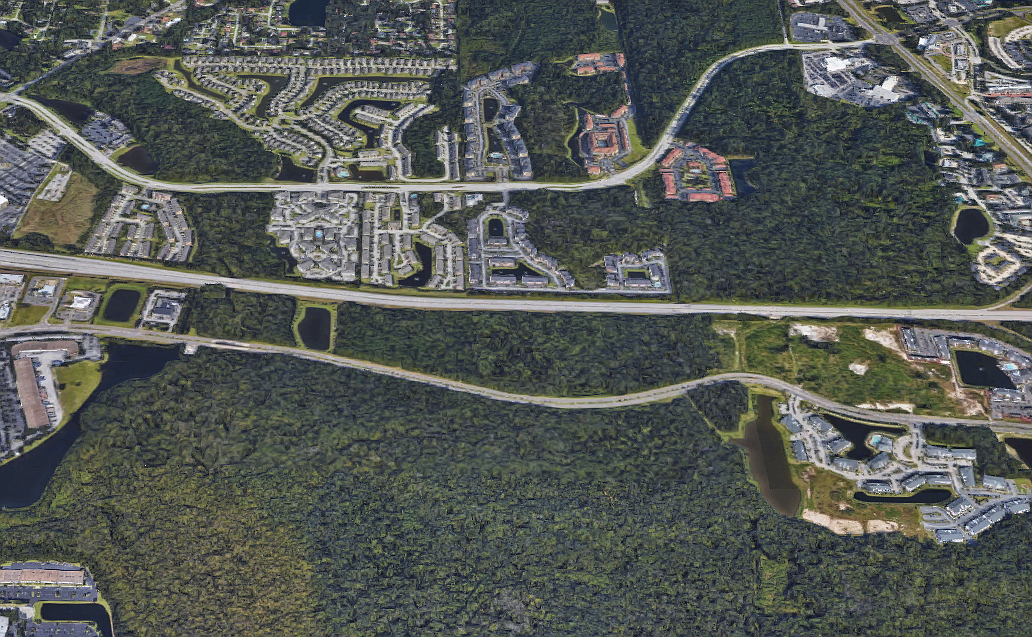
Jacksonville Transportation Authority is preparing to sell 17.51 acres for apartment development in South Jacksonville.
The city calculated a $349,959 mobility fee for what will be a 370-unit apartment community between Butler Boulevard and AC Skinner Parkway, near Southside Boulevard.
JTA plans to sell the property to Texas-based PG Investco LLC., a subsidiary of Presidium Group, which is partnering locally with Killashee Investments LLC.
Plans include five four-story apartment buildings and five two-story carriage-house buildings along with a leasing and amenities building.
Connelly & Wicker Inc. is the project engineer with Dix.Hite + Partners providing landscape architect services. Dwell Design Studio is the architect.
Plans submitted to the city show five apartment buildings along AC Skinner Parkway with the carriage houses, with two units each, closer to Butler Boulevard.
About 52,000 square feet is set aside for active recreation space and could include a dog park with a pet-washing station, a pool and other amenities. The proposal includes parking for 556 vehicles.
Killashee partner Mark Farrell previously said the group has a contract to purchase the site.
The JTA board of directors gave CEO Nathaniel Ford the OK to proceed with a $7.58 million purchase and sale agreement with the development groups in March 2018.
Construction is expected to last 20 months.
City Council members approved legislation to rezone the property in August to planned unit development to allow for multifamily residential construction.
JEA seeks a zoning exception for 1,849 acres in West Jacksonville for a solar farm.
The property is zoned as a planned unit development.
The exception would allow JEA to add the “essential services” category of uses, so it can proceed with a photovoltaic solar energy farm.
JEA paid $18.8 million for the West Jacksonville site to develop the Deep Creek Solar Center.
The utility is developing at least 13 solar sites in the Jacksonville-area, including five in West and Northwest Jacksonville.
In addition to the Deep Creek site, JEA also has 400 acres to build a Beaver Street Solar Center, 400 acres for a Cecil Commerce Solar Center and 952 acres for the Westlake Solar Center in West Jacksonville.
In Northwest Jacksonville, the company has 601 acres set aside for the Forest Trail Solar Center.
Jacksonville City Council members soon will review a zoning overlay for the Renew Arlington Community Redevelopment Area.
The Renew Arlington CRA board approved the measure Feb. 12 that overhauls design standards for parts of the Arlington neighborhood.
The zoning overlay now heads to the Planning Commission, followed by public hearings at the council Land Use and Zoning Committee before a full vote by lawmakers in March.
Two other measures that fund and provide guidance for a façade and property improvement grant program did not receive votes because of time restraints.
Those issues need only the approval of the CRA board, which is expected to hold a special meeting to review those changes before May.
The zoning overlay is the result of nearly four years of work by the seven-member CRA advisory board, local business owners, residents, council members and the city Public Works Department.
It includes hard deadlines for property owners to meet new landscaping, fencing and signage requirements; establishes five “character areas” within the CRA boundaries; and lists general design guidelines intended to make commercial corridors more pedestrian-friendly and economically viable.
The CRA boundaries include 1,302 properties along three corridors in Arlington: University Boulevard from the Arlington Expressway to Fort Caroline Road; Merrill Road from University Boulevard to Interstate 295; and a section of Arlington Road from University Boulevard to Rogero Road.
The character areas comprise the University Village, University Commercial, Merrill Commercial, Arlington Road and Catalyst districts that feature distinct design guidelines and performance standards.
Matt Tuohy chairs the CRA advisory board and is director of aeronautics for the Jacksonville University Davis College of Business.
Tuohy told council members Feb. 12 that the board worked through several revisions to present a final draft. He acknowledged that some community members still were not satisfied.
“However, just because suggestions weren’t accepted, doesn’t mean their voices weren’t heard,” Tuohy said.
Those concerns revolve around deadlines property owners must meet regarding landscaping, fencing and signage.
Property owner Bill Cesery told the panel that renovations to his Lake Lucina Shopping Center along Merrill Road would cost more than $100,000 if the overlay is adopted as is.
To offset those costs, the CRA board is expected to approve a façade grant program with proposed initial funding of $225,000, although that amount could increase.
For most projects, the grant is a dollar-for-dollar match up to $10,000 for each property owner.
To address landscaping, signage and fencing improvements, the city is increasing that amount to $20,000 during the first two years of the program.
Per state law, 95 percent of the revenue generated from the increase in property taxes within the CRA boundaries is used to fund programs and projects identified in the CRA development plan.
Officials estimate about $59 million in additional funding could be generated to improve roadways, bury utilities and improve stormwater infrastructure by the time the CRA sunsets in 2035.
During the 2016-17 and 2017-18 fiscal years, properties within the city’s CRA boundaries generated about $891,000 in ad valorem taxes.
That figure is expected to be about $755,215 for the current fiscal year, which ends Sept. 30.